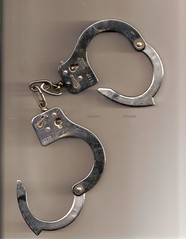 In celebration of Black History Month the ACLU is posting a variety of personal narratives on their blog. Inimai Chettiar was the author of one that should be of particular interest to our readers here: Why Mass Incarceration is the New Jim Crow.
In celebration of Black History Month the ACLU is posting a variety of personal narratives on their blog. Inimai Chettiar was the author of one that should be of particular interest to our readers here: Why Mass Incarceration is the New Jim Crow.
In it she tells of being pulled over while in a car with her friend Jamal, an African-American man. Jamal refused a breathalyzer test because, she states, he felt there was no cause for arrest. Police then put him in cuffs and brought him in since declining the breathalyzer results in a mandatory arrest, incarceration, and a one year driver’s license suspension. Penalties that police are not required to notify drivers about.
It’s a sad story about one man becoming a statistic, and a story that makes it easier to understand why 1 in 3 black men in the United States have spent time behind bars.
At the arraignment, I was not surprised that every driver pulled over the night before was black or brown. A recent Department of Justice study found “an alarming racial disparity” in police treatment of motorists of color. Black Americans are twice as likely to be arrested during a traffic stop and nearly four times as likely to experience the threat or use of force. Cops regularly pull over black men for minor traffic infractions and then arrest them, while they let white drivers drive on. What made Jamal more likely to be pulled over and arrested than other Americans was his misfortune at being a Black man driving at night in a rich white suburb.
Numbers attest to the fact that African Americans make up a disproportionate percentage of our prison populations. It’s a sobering thought, but once you start to consider the extent of it’s ramifications it becomes downright frightening.
This system of racial profiling and using prison as a one-size-fits-all solution is one of the reasons Black communities are and will remain economically worse off than the rest of the America. More Black men are imprisoned by this country than were ever enslaved. It’s bad enough that the Great Recession has affected Black men more than every other demographic, but our ever expanding prison complex is further decimating the already bleak economic future of Black America.
Jamal will suffer the repercussions of this arrest for his entire life. Without a license, he had to quit his job. After employment applications asked for arrest records, his political appointment is now in danger, a job offer from state government was suspended, and several companies cancelled interviews.
All for going 13 miles over the speed limit, while sober.
This is not new news. Professor Pamela Oliver of the University of Wisconsin is one of the people behind the Wisconsin Racial Disparities Project, and her findings over the years have shown that African Americans are imprisoned at least eight times as often as Americans of European descent. Not only that, but American Indians and Hispanics are imprisoned at two to three times the rate that Caucasian Americans are.
As far back as 2005 she was unearthing disturbing data on this subject. Just take a look at this report for an example:
“The Effect of Black Male Imprisonment on Black Child Poverty.” Pamela Oliver, Gary Sandefur, Jessica Jakubowski, and James E. Yocom. Presented at the American Sociological Association August 13, 2005. We find that high Black male imprisonment contributes to high Black child poverty several years later. There are two mechanisms. The first is lower family earnings, especially in two-parent less-educated families, which is presumably due to the reduction in earnings of men with prison records. The second is more complex: high Black male imprisonment is associated with a rise over time in the proportion of Black children living with mothers who have not graduated from high school; this rise occurs despite an overall rise in Black mothers’ education and a positive association between Black male imprisonment and the proportion of children living with mothers who are married college graduates. Due to file sizes, the report and the tables are in two files. Report text as PDF file Tables as PDF file
It is, as so many of the issues facing our justice system, a chronic and long standing problem.
Image Source: Cuffs by cdogstar on Flickr, used under it’s Creative Commons license










